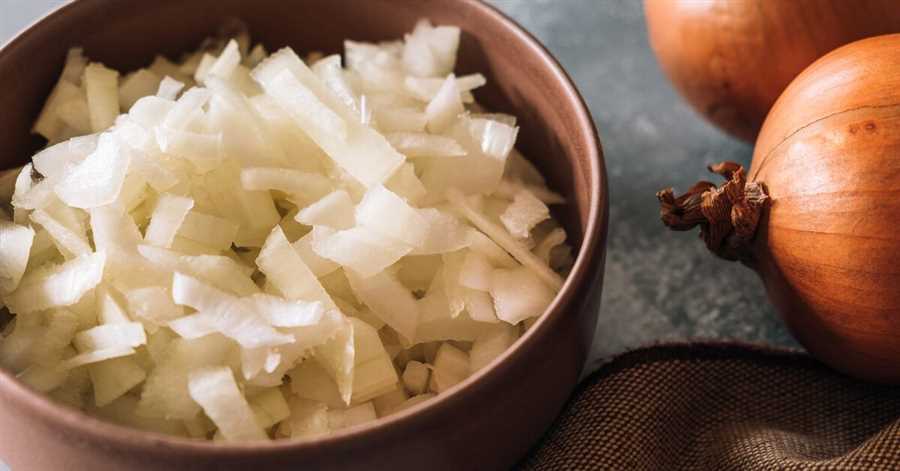Onions are a versatile vegetable that is commonly used in cooking around the world. They are known for their rich flavor and ability to enhance the taste of various dishes. However, some people may experience gas or bloating after consuming cooked onions.
Gas is a normal part of the digestion process. When we eat food, our digestive system breaks it down, releasing gas as a byproduct. However, certain foods can promote the production of gas in the digestive system, leading to discomfort and bloating.
Cooked onions contain a type of carbohydrate called fructans, which are known to cause gas in some individuals. Fructans are a type of fermentable fiber that can be difficult for our bodies to break down. When these fibers reach the large intestine undigested, they are fermented by the bacteria in our gut, producing gas as a result.
It is worth noting that not everyone is affected by cooked onions in the same way. Some individuals may have a higher tolerance for fructans and may not experience any gastrointestinal discomfort after consuming cooked onions. However, those who are more sensitive to fructans may benefit from reducing their intake of cooked onions or replacing them with other low-FODMAP (fermentable oligosaccharides, disaccharides, monosaccharides, and polyols) vegetables.
In conclusion, cooked onions contain fructans, a type of fermentable fiber that can cause gas in some individuals. If you experience gas or bloating after consuming cooked onions, it may be worth reducing your intake or exploring other low-FODMAP vegetable options.
Effect of Cooked Onions on Gas Formation

Gas formation in the digestive system can be uncomfortable and potentially embarrassing. Many factors can contribute to the production of gas, including diet and certain foods. Onions are often blamed for causing gas due to their high content of fructans, a type of carbohydrate that can be difficult to digest.
The Role of Fructans
Fructans are a type of fiber that can ferment in the colon, leading to the production of gas. Onions are particularly rich in fructans, and cooking them can help break down these complex carbohydrates, making them easier to digest.
Cooking Onions to Reduce Gas Formation
Cooking onions can help reduce the likelihood of gas formation. When onions are cooked, the heat breaks down the fructans, making them less likely to cause digestive discomfort. Sauteeing, grilling, or roasting onions are all effective cooking methods that can help reduce the levels of fructans and make them easier to digest.
It’s important to note that individuals may differ in their sensitivity to fructans, and some people may still experience gas after consuming cooked onions. If you are particularly sensitive to fructans or experience excessive gas after eating cooked onions, it may be best to limit your intake or consult a healthcare professional for further guidance.
In conclusion, while raw onions are often associated with gas formation, cooking onions can help break down the fructans responsible for digestive discomfort. If you enjoy the flavor of onions but find that they cause gas, consider incorporating cooked onions into your meals as a potentially more digestible alternative.
Understanding the Relationship between Cooked Onions and Gas
Onions, whether raw or cooked, are a staple ingredient in various cuisines around the world. While they add flavor and depth to dishes, some people may experience gas and bloating after consuming cooked onions. This article aims to provide a better understanding of the relationship between cooked onions and gas.
Why do onions cause gas?
Onions contain a type of carbohydrate called fructans, which are not easily digestible by the human body. When consumed, fructans pass through the small intestine without being fully broken down. They then reach the large intestine, where they serve as food for gut bacteria.
The gut bacteria ferment the fructans, producing gas in the process. This gas can cause bloating, discomfort, and flatulence in individuals who are sensitive to fructans or have difficulty digesting them.
Why does cooking onions affect gas production?
Cooking onions can have a two-fold effect on gas production. Firstly, cooking breaks down some of the fructans present in onions, making them more digestible. This means that cooked onions may cause less gas and bloating compared to raw onions.
However, cooking onions also releases volatile compounds known as sulfur compounds. These compounds, such as allyl sulfide and allyl mercaptan, are responsible for the strong odor often associated with onions. They can also contribute to intestinal gas production in some individuals.
It is important to note that the effects of cooked onions on gas production may vary from person to person. While some individuals may find cooked onions easier to digest, others may still experience gas and bloating due to the sulfur compounds they contain.
Tips for reducing gas from cooked onions:
- Use smaller amounts of onions in your dishes.
- Try cooking onions for longer periods, as this may help break down more fructans.
- Experiment with different cooking methods, such as grilling or sautéing, to see which works best for you.
- Consider taking over-the-counter digestive enzyme supplements that can aid in breaking down fructans.
In conclusion, while cooked onions may cause less gas compared to raw onions due to the breakdown of fructans, they can still contribute to gas production in some individuals. Understanding your own tolerance and experimenting with different cooking methods and portion sizes can help mitigate any discomfort associated with consuming cooked onions.
Factors Affecting Gas Formation from Cooked Onions
1. Sulfur Compounds: Cooked onions contain sulfur compounds, such as allyl sulfides, which can contribute to gas formation. These compounds are responsible for the distinct smell and taste of onions, but they can also cause digestive discomfort for some individuals. The fermentation of these compounds by gut bacteria produces gases such as hydrogen sulfide and methane, which can lead to bloating and flatulence.
2. Cooking Methods: The way onions are cooked can affect the level of gas formation. Overcooking or prolonged cooking can break down sulfur compounds in onions, resulting in the release of more gas-causing substances. On the other hand, shorter cooking times or blanching onions before cooking can help reduce the gas-producing potential.
3. Gut Microbiota: Every individual’s gut microbiota is unique, and differences in the composition and activity of gut bacteria can influence the extent of gas formation from cooked onions. Some individuals may have a higher abundance of bacteria that are more efficient at fermenting onion compounds, leading to increased gas production.
4. Onion Variety: The variety of onion used can also impact gas formation. Certain varieties, such as yellow onions, tend to have higher levels of sulfur compounds than others, like sweet onions. Therefore, cooking with different onion varieties may result in varying levels of gas production.
5. Individual Sensitivity: Each person’s tolerance to gases produced from cooked onions can vary. Some individuals have a lower threshold for gas formation and may experience more pronounced symptoms, while others may be more resilient and have little to no discomfort.
6. Portion Size: The amount of cooked onions consumed can influence the severity of gas formation. Larger portion sizes can lead to higher gas production, especially if the individual is sensitive to onion compounds. Moderation is key to minimizing gas-related symptoms.
7. Combining Ingredients: Cooking onions with other gas-producing foods, such as beans or cruciferous vegetables, can exacerbate gas formation. The combination of these ingredients can create an environment in the gut that promotes gas production, leading to more discomfort.
Overall, while cooked onions can cause gas in some individuals, the specific factors mentioned above play a role in determining the extent of gas formation. Understanding these factors can help individuals make informed dietary choices and minimize digestive discomfort associated with cooked onions.
Methods to Reduce Gas from Cooked Onions
While cooked onions can sometimes cause gas, there are several methods that can help reduce this unpleasant side effect.
1. Soak the Onions
One effective method to reduce the gas-causing compounds in cooked onions is to soak them in water for approximately 30 minutes before cooking. This helps to remove some of the sulfur compounds responsible for the gas. Remember to rinse the onions thoroughly after soaking to ensure that no residual sulfur compounds remain.
2. Cook the Onions at a Lower Temperature
Cooking onions at a lower temperature can help reduce the production of gas. High heat causes the breakdown of certain compounds in onions, which can lead to the release of gases. By cooking onions at a lower temperature, you can minimize this process and decrease the likelihood of experiencing gas.
Note: It is important to ensure that the onions are fully cooked and soft before consuming to aid digestion and reduce the chances of gas formation.
Additionally, while cooked onions may contribute to gas formation, it is worth noting that individual tolerance levels can vary. Some people may experience more gas from onions than others, so it may be necessary to adjust their intake accordingly.
In conclusion, soaking the onions before cooking and cooking them at a lower temperature are two effective methods to reduce gas caused by cooked onions. By implementing these techniques, one can enjoy the flavor and nutritional benefits of onions without worrying about excessive gas formation.
Questions and answers
Do cooked onions cause gas?
Yes, cooked onions can cause gas. When cooked, onions release certain compounds that can cause gas and bloating in some individuals.
Why do cooked onions cause gas?
Cooked onions cause gas because they contain fructans, which are a type of carbohydrate that can be difficult for some people to digest. When these fructans reach the large intestine, they ferment and produce gas as a byproduct.
Are there any ways to reduce gas caused by cooked onions?
Yes, there are some ways to reduce gas caused by cooked onions. One approach is to cook the onions for a longer period of time, as this can help break down some of the compounds that cause gas. Another option is to use a digestive enzyme supplement, such as alpha-galactosidase, which can help break down the carbohydrates in onions.
Can some people tolerate cooked onions without experiencing gas?
Yes, some people may be able to tolerate cooked onions without experiencing gas. The ability to digest and tolerate certain foods can vary from person to person. It is also worth noting that some types of onions, such as leeks and shallots, have lower amounts of fructans and may be better tolerated by individuals who are sensitive to this carbohydrate.
What are some alternative ingredients that can be used instead of onions to avoid gas?
If you want to avoid gas caused by onions, there are several alternative ingredients that you can use. Some options include using garlic powder or garlic-infused oil as a substitute for fresh onions. You can also experiment with other herbs and spices to add flavor to your dishes, such as oregano, basil, or cumin. Additionally, you can try using vegetables like bell peppers or celery to add texture and flavor to your recipes.






